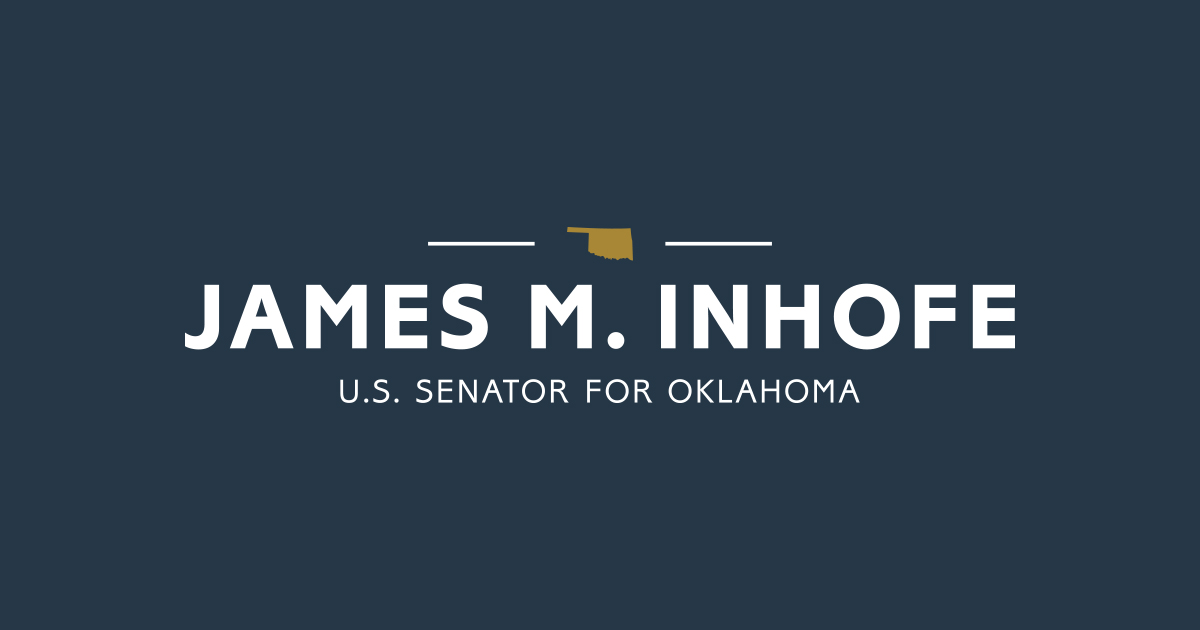Source: United States Senator for Oklahoma James Inhofe
Today, U.S. Sen. Jim Inhofe (R-Okla.), senior member of the Environment and Public Works (EPW) Committee, questioned witnesses at a hearing to consider President Biden’s nominees for positions at the U.S. Environmental Protection Agency and the Southeast Crescent Regional Commission.
Witnesses included: Christopher Frey, nominee to be the Assistant Administrator for Research and Development at the Environmental Protection Agency and Jennifer Clyburn Reed, nominee to be Federal Co-Chair of the Southeast Crescent Regional Commission.
Inhofe: Well, let me first of all say, Ms. Reed, that I, unfortunately, only served with your father for a year and a half, but that was a very rewarding year and a half, and I consider him to have remained a good friend in that time.
Dr. Frey, the EPA’s Robert S. Kerr Research Center – I know you’re familiar with that – in Ada, Oklahoma, has been there for a long period of time, and it’s leading the nation in a type of water research known as Enhanced Aquifer Recharge, or EAR for short. They’ve done a very good job over a long period of time. As you know, it utilizes natural methods for the capture and replenishment of our nation’s aquifers, and for years, Congress has allocated the necessary funding to keep that going.
Now, it is my understanding – I got this second hand, so I honestly don’t know, Dr. Frey, the source of that – but apparently, there has been a hold up in coordinating the local entities as we normally are expecting. Would you make advancing research in this Enhanced Aquifer Recharge a priority if you are confirmed?
Frey: Thank you, Senator Inhofe, this is obviously an important issue for your state of Oklahoma because the aquifer – the Arbuckle-Simpson aquifer in particular – is a major resource for farmers, ranchers and anyone who drinks water. The program you allude to on Enhanced Aquifer Recharge ORD staff have been working with the U.S. Geological Survey on engineered methods to use storm water to help recharge the aquifer. As you point out, that’s being done at ORD’S Ada, Okla., lab.
Yes, this is an important priority for us. It’s something that I anticipate and would expect under my leadership that we would continue to work with you on this issue. I know it is important to you and to Oklahoma and it’s also important that the same issues are faced in other parts of the country as well.
Inhofe: I appreciate that very much and that you are familiar with that program. I understand that you are on a leave of absence; it’s an unpaid academic position that you’ve had with Hong Kong University of Science and Technology. One federal watchdog group called this Chinese university, “anything short of an arm of the Chinese government.” Now, I am pleased you have committed to resigning this position with this university should you be confirmed. First, I want to ask you if that would be your intention.
Frey: Absolutely sir, yes.
Inhofe: Do you share the concerns that we have with China’s poor record? They’re the largest polluter out there and on record particularly as it remains the world’s largest polluter as they still are today. So, what are your thoughts about that and should that be a factor in your confirmation process. I wanted to give you a chance to address that because others have talked about it.
Frey: Thank you, Senator. Yeah, I really appreciate this opportunity. My involvement with research colleagues in Hong Kong is because as an educator for 27 years, my goal has been to mentor students and to develop new knowledge. It’s a very common practice in academia to seek out international collaborations especially in areas of science where we can deal with challenging scientific issues that help us push the boundaries of our own science. So, my relationship with colleagues at HKUST, the university you mentioned, has been one of research and mentorship of students and collaboration, specifically on issues of human exposure to air pollution. I think we all know that that region of the world is facing very severe air pollution, and there is actually a lot of interesting science issues there that we can learn from to inform best science here in the United States. So, my work has really been in the realm of the science not in the realm of the policy or geopolitical issues that you mentioned. I will say that when I came on board in my current role with the EPA nine months ago, I fully disclosed all of my affiliations, including this unpaid adjunct affiliation. I have been following the advice of our Office of General Counsel at EPA and ethics officials, and on that advice, they have confirmed that I would resign this unpaid, adjunct position.
Inhofe: Yeah, it’s always been a concern to me that many of the extreme groups that are out there hold a great regard for China and their record, and yet, they continue to be the greatest polluter around. I’ve often wondered how they get by with that. Thank you very much, doctor.
Frey: You’re welcome, Senator.
Inhofe: And thank you, Senator Capito for giving me some time up front.
